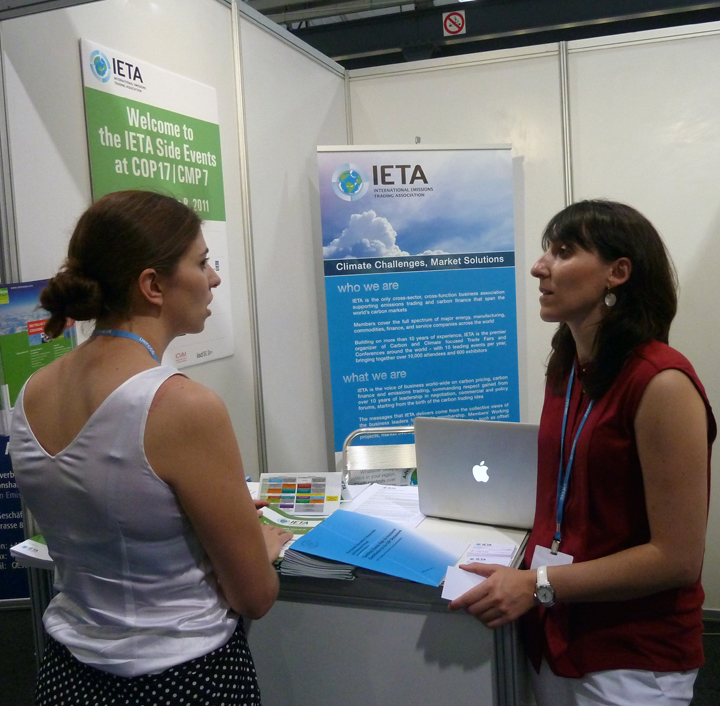 29 March 2012
29 March 2012
Note: Sustainable Energy For All, or SEFA, is a UN initiative focused on “clean” energy development in the developing world. Coincidentally, it might be a scheme to increase the role that multi-national corporations play in delivering energy services to communities, and to decrease pressure on developed countries (US, Canada, EU member-states) to implement energy efficiency and carbon-neutral projects. Check out a BiofuelWatch report on SEFA, Sustainable Energy for All-Or Sustained Profits for a Few? for more background information.
-Gears of Change Youth Media
As soon as Morton Wetland, Norway’s representative to the UN, opened his mouth to moderate a panel discussion on public-private relationships for the Sustainable Energy For All (SEFA) initiative, it was clear on which side of the public-private divide the panelists stood. In a belittling tone he said, “I was informed that the G77 has deleted everything in the text which has not been proposed by the G77,” referring to the attempts of mostly southern countries to defend against the stripping away of all language in the Zero Draft document referring to human rights, social inclusion and equity. Considering the chummy, smug chuckles this comment elicited from the room, it immediately appeared that this discussion of SEFA would be more concerned with what is good for business than with what is best for human and natural communities.
SEFA may seem to be an initiative with good intentions—to increase global access to clean, “modern” energy sources—but what ultimately plays out on the ground looks to have dire consequences. The initiative happens to include members from some of the world’s most lovable institutions: Charles Holliday, current chair of America and former director of DuPont, also chairs SEFA. Statoil, Bloomberg New Energy Finance, and Riverstone Holdings, represented by former BP CEO John Browne, are all there too. Mark Moody Stuart, ex chairman of Shell, is also on the board.
What kind of projects can we expect this not-so-motley crew to promote? According to Rachel Smolker from BiofuelWatch, “The first country commitment for the Sustainable Energy For All initiative is from Ghana, and it is a project which will construct a natural gas pipeline in the country with the assistance of a UK company that has long been seeking to do that.” Since when is natural gas considered sustainable energy? In this case, the private sector is using the legitimate concern of improving the health of rural women to push through business-friendly mandates at the national and international levels. Apparently that is the kind of sustainable energy you get when you put the heads of some of the largest energy and finance corporations in charge.
At first glance, it seems like the old regime has just put on new masks. As Justin Perrettson, a panelist representing biotech giant Novozymes, said, “Business as usual doesn’t work…its all about companies doing what they do better,” and, “Sustainable energy is all about mindset.” Indeed, so long as stopping business as usual means creating new, more attractive markets to investors and business, and the mindset with which sustainability is defined thinks primarily about profit margins, investment opportunity and increased corporate power instead human rights, environmental impact and community control.
Perrettson’s presentation focused primarily on the new market potentials for biotech (bioenergy, bioplastics, biochemicals) that SEFA can create with proper public investment and backing. He hopes that the Rio+20 process can be used to initiate, “…a dialogue around…the bio-based economy,” which involves using more of the planets living communities in a more productive way. What he really means is identifying things like “agricultural residues,” which are often vital to traditional forms of agriculture for maintaining soil fertility, and transforming them into synthetic fuels, plastics and chemical products. Not to mention his apparent infatuation with corn, which he described as a, “ power plant.”
If industrial-scale biomass and biofuels are considered sustainable—which they currently are—than SEFA will serve as a mechanism to make investments in these dangerous technologies more attractive. As no less than three panelists pointed out during the hour and a half long session, “Green [as in the Green Economy being promoted at Rio+20] is a good word because it also means the color of money.”
The 800 pound gorilla in the room, of course, was the actual financing for large scale energy projects. Petter Norre, who has spent decades in the Norwegian oil and gas industry and is now a member of the SEFA technical advisory group, described a subset of SEFA, Energy+. Energy+ was developed last fall by UN Seretary General Ban-Ki Moon and the Norwegian government, and is focused on creating attractive investment opportunities for renewable energy projects in the developing world. It is inspired by the Reducing Emissions from Deforestation and forest Degradation (REDD) initiative, which is vehemently opposed by many civil society and indigenous organization throughout the world. Energy+, like REDD, is all about climate finance and making countries, “Green Fund-ready.”
In Norre’s words, Energy+ is about, “…getting down the country risk for big international investors who live by their spreadsheets and their cost of capital….” In other words, how to get the public sector to subsidize, deregulate or structurally adjust in ways that can make otherwise risky development projects appear attractive to the big multi-nationals. And what is the real role of the public sector here? Unfortunately, it doesn’t seem to be providing a regulatory framework to ensure equity and rights. Quite the contrary, according to Norre, the public sector needs to provide, “…a regulatory framework to have a state that functions that somehow encourages investment.”
Just as Energy+ was making me feel warm and fuzzy about the role the private sector would play in what was now being discussed mostly in terms of finance, decoupling risk from investment, and commercial opportunity, the World Bank reared its ugly head. While I was surprised to hear World Bank Senior Energy Specialist Magnus Gehringer talking about geothermal (I figured they also would have been in the natural gas-as-sustainable energy camp), his presentation came to similar conclusions as Norre’s. Speaking with a starry-eyed gaze about the potentials of geothermal energy, Gehringer explained the Bank’s new push, coming from the Energy Sector Management Assistance Program (ESMAP), to access this below ground energy source. Drill, baby, drill.
While geothermal has a relatively high return on investment, it requires huge upfront costs. The biggest hurdle for countries lacking access to large amounts of cash is the test drilling required prior to geothermal development. It is prohibitively expensive and requires drilling 2-3 km below the ground. And this is to test for geothermal potential.
But high up-front investment costs won’t stop the World Bank. In fact, nothing short of direct community resistance will. Magnus showed a map of geothermal hotspots, most of which are in the southern Pacific Ocean, the western coasts of North, Central and South America, and eastern Africa. While it is true that geothermal is at the “edge of what people think about,” that might be due to the fact that most of the world is looking for solutions that are cheap, don’t require huge amounts of international finance and corporate control, and that won’t result in further ecological destruction. As Gehringer noted, “Japan has an estimated potential…of 23,000 megawatts….And they didn’t use it because most of their geothermal fields are in national protected parks, and they didn’t want to damage their landscape.” Well shame on you, Japan, for placing ecological protection before increased energy development. The Bank will have to see about that.
The scariest piece of what the Bank is proposing, and about all public-private partnerships proposed for Rio+20, are the proposed private sector benefits. Gehringer described a dream project of his, involving, “…a loan [for geothermal development] to the…east African countries for example, that they could then repay by just, for example, tendering out some of their [developed geothermal] fields to the private sector, and they would get their money back and they could repay the loans and still keep some of it.” How much of whose fields? When do they get them back? And at what cost to local people and the planet?
What is so troubling about this initiative, as Ana Belén Sánchez López from Sustainlabour pointed out in a question to the panel, is that increasing access to safe, reliable, sustainable energy is a crucial issue for women, workers and many of the world’s most marginalized people. Energy is necessary for survival. However, it is also imperative that energy is considered in the context of human rights, not market commodities, and that the public sector—trade unions, civil society organizations, local communities—have a real seat at the table.
Sustianable Energy For All needs to focus on making projects that work for public utilities, and that really address the needs of local communities in healthy, sustainable ways. It can’t be used as a Trojan Horse for the corporate world to ride into marginalized urban and rural areas to access newly developing markets. That is not the future we want. As the moderator made clear in his response to Sánchez López’s comments, the focus needs to be on the private sector because right now the private sector is a, “four-letter word,” at the UN. Well, maybe it should stay that way.


































